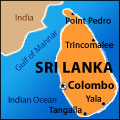Ilankai Tamil Sangam30th Year on the Web Association of Tamils of Sri Lanka in the USA |
|||
 Home Home Archives Archives |
UN Expert Urges Targeted Measures to Assist Internally Displacedby UN News Centre, December 27, 2007
 While considerable efforts have been made to assist hundreds of thousands of people displaced by conflict in Sri Lanka, more must be done to ensure their safety and access to livelihoods so that they can lead normal lives, according to an independent United Nations human rights expert who recently visited the country. While considerable efforts have been made to assist hundreds of thousands of people displaced by conflict in Sri Lanka, more must be done to ensure their safety and access to livelihoods so that they can lead normal lives, according to an independent United Nations human rights expert who recently visited the country.
“Sri Lanka, with the crucial support of the international community, has not only rehabilitated the majority of victims of the 2004 tsunami, but also made considerable efforts to assist those displaced since the escalation of hostilities in 2006,” Walter Kälin said in a statement issued following his 14 to 21 December mission to the country, which has been enduring civil conflict between Government forces and the Liberation Tigers of Tamil Eelam (LTTE) for a number of years. During his visit, Mr. Kälin – the Secretary-General’s Representative on the Human Rights of Internally Displaced Persons (IDPs) – met with Government officials and representatives of civil society and the international community in the capital, Colombo. He also visited areas in Puttalam, Vavuniya, Trincomalee and Batticaloa districts, where he met with IDPs and returnees, community and religious leaders, security officials and members of non-governmental organizations (NGOs) and UN agencies. He was unable to visit Kilinochchi to discuss humanitarian and protection concerns with the LTTE. Mr. Kälin noted that the majority of the more than 220,000 people who fled their homes in the Eastern Province between April 2006 and March 2007 have returned, been provided with transitional shelter, and are beginning to regain their former lives. At the same time, he stressed that targeted measures in the areas of security, livelihoods and humanitarian access “are essential if these returns are to be sustainable in both the near and long-term.” Mr. Kälin identified physical security as the predominant concern among IDPs, saying he was struck by “a pervasive sense of fear and uncertainty” among the people he spoke with due to a number of factors, including continued incursions and attacks by the LTTE, and disappearances, abductions and looting. Another major concern of IDPs and returnees was access to livelihoods, Mr. Kälin observed, noting that significant restrictions – some imposed by the authorities and others related to security – remain. He encouraged the authorities to restore full access to livelihoods. Mr. Kälin stated that better information sharing and consultations between the Government and the IDPs, as well as members of the international community, would help reduce the prevailing sense of insecurity and facilitate the reintegration of returnees. Noting the challenges faced by NGOs providing humanitarian assistance in areas of return, Mr. Kälin added that “better access for agencies and NGOs working on protection would improve confidence among IDP populations because these agencies can identify and promptly facilitate the local resolution of individual concerns.” He also voiced concern about threats, abductions and killings of aid workers, searches of UN vehicles and staff, looting of humanitarian assets, and slow response by police authorities in some cases. Mr. Kälin stressed that allowing the displaced to lead normal lives, with decent housing and full access to livelihoods and services on the one hand, and preservation of their right to opt for eventual return and their property rights on the other, are not mutually exclusive. “Finding sustainable solutions will not only allow IDPs and returnees to fully enjoy their human rights, but also crucially contribute to restoring stability in the country,” Mr. Kälin stated. “Significant efforts in this area will be an important step towards durable peace in Sri Lanka.” The Representative will submit his report to the Geneva-based UN Human Rights Council. In addition to Sri Lanka, he has also recently visited the Central African Republic, Azerbaijan and Côte d’Ivoire. Meanwhile, the UN Office for the Coordination of Humanitarian Affairs (OCHA) has just completed an assessment of the situation in Batticaloa District following recent floods caused by heavy rains over the past two weeks. Over a quarter of a million people are thought to be affected by the flooding, which has resulted in the displacement of over 40,000 people and disrupted road travel and train service, OCHA said in a press release. The assessment found that most families had returned to their homes, but concerns remain about contaminated wells, loss of household goods, water-borne diseases and long-term food needs. The Government has said it will cover the main food needs, but has requested support to address urgent non-food relief items. The UN Children’s Fund (UNICEF) has provided 1,000 mats and bed sheets and is supporting local authorities in providing water, while the UN Resident and Humanitarian Coordinator has released about $20,000 to address the most immediate needs. The Sri Lanka Red Crescent Society and NGOs are also providing aid. |
||
|
|||